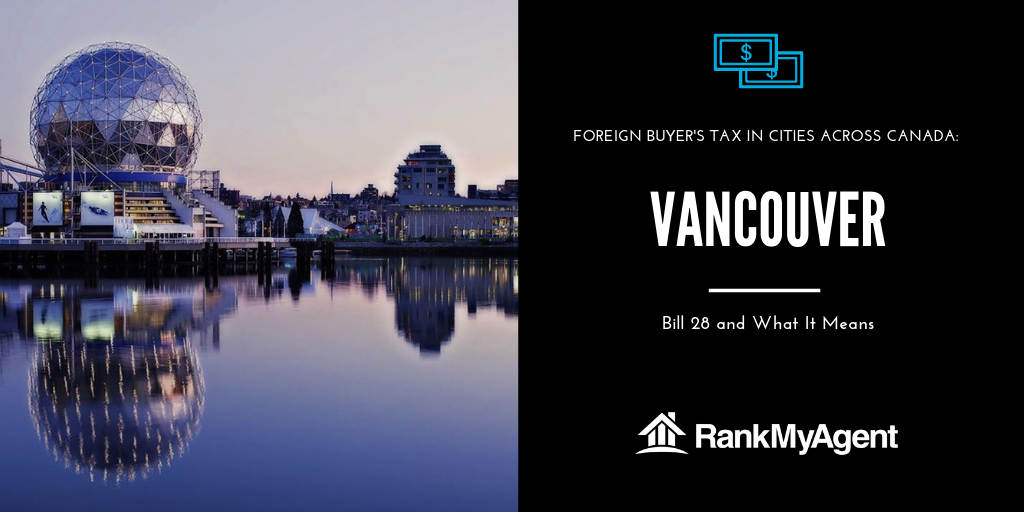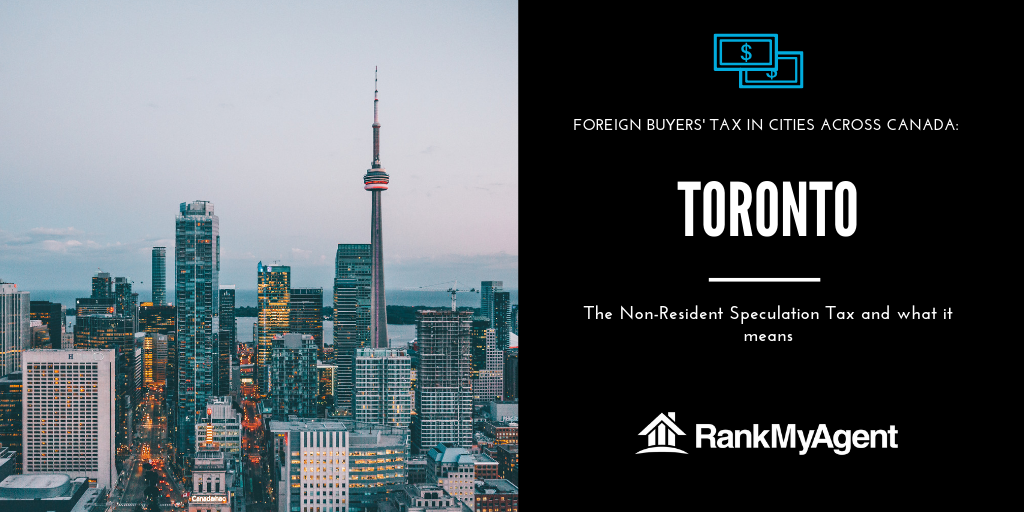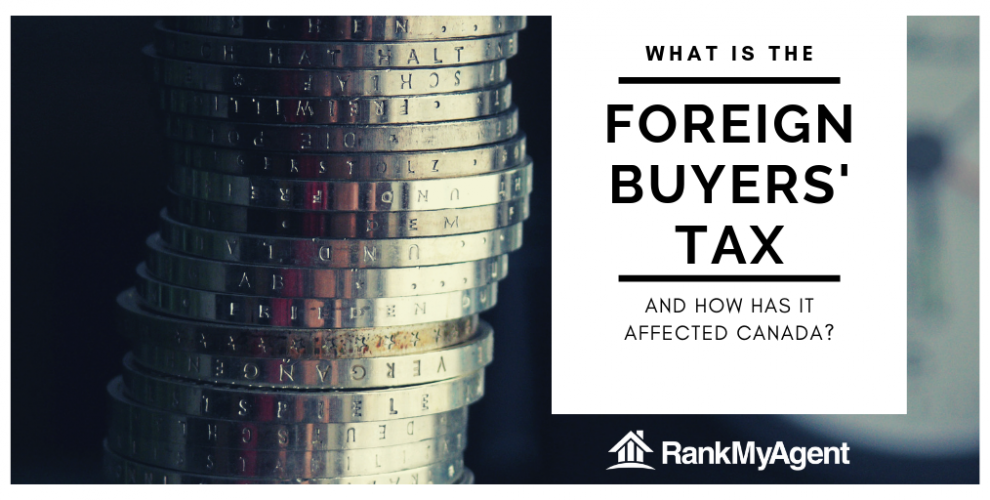“Insane” is an understatement when describing the Canadian real estate market over the past few years. Prices in Vancouver and Toronto have become unattainable for the average Canadian. While the reasons for this market are inconclusive, foreign investment is at least partially blamed.
A study by the Canada Mortgage and Housing Corporation found that 68% of Vancouver respondents, 48% of Toronto respondents, and 42% of Montreal respondents believe foreign buyers have “a lot of influence” on driving home prices up. In reality, low mortgage rates, rising incomes, a growing population, and market psychology all played a large factor in rising prices.
To combat the unaffordability of housing, Toronto and Vancouver implemented provincial policies to reduce foreign purchases of Canadian real estate. This has been done primarily through a foreign buyers’ tax.
Foreign Buyers’ Tax in Cities Across Canada

Vancouver
Vancouver has been the poster child for high Canadian real estate prices. And on August 2nd, 2016, British Columbia decided to intervene by creating an additional property transfer tax on non-Canadian and non-permanent resident homebuyers. This comes after many residents and affordable housing advocates complained that foreign buyers were driving up home prices to unattainable levels.
Bill 28 implemented a tax for non-residents (neither Canadian citizen nor permanent resident) purchasing Canadian residential property. This policy only affected the Metro Vancouver area at first. But in 2018, the foreign-buyers tax was raised to 20%, and the area of effect expanded to Fraser Valley, Capital, Nanaimo, and the Central Okanagan Regional Districts.
This additional property transfer tax has two exemptions. First, if you’re exempt from regular property tax, you’re also exempt from the foreign buyers’ tax. Second, if you’re a confirmed B.C. Provincial nominee and fit the additional specified criteria, you’re also exempt.
Certain circumstances can qualify you for a refund for the foreign buyer tax, as well. This refund is primarily for those who become a permanent resident or Canadian citizen within one year of the date that the property transfer was registered in the Land Title office.
Since the initial tax started in Vancouver, foreign buyers dropped significantly. Before the tax, 13% of buyers were foreign nationals, but this dropped to 1% afterwards. A year after (in 2017), the number hovered around 3-4% depending on the area. Inquiries about Vancouver real estate on Juwai.com, China’s largest overseas property website, declined dramatically, while inquiries into Toronto and Seattle properties subsequently rose.
This tax, like any other tax, has brought in additional revenue for the B.C. government. Property transfer tax in 2017/2018 accounted for $2.1 billion, which was $266 million more than expected. But while the housing market softened a bit, how the tax has affected home prices was not conclusive at first.
The Metro Vancouver housing market in 2019 has slowed down. Newspapers now frequently note home prices below what was seen before the tax. But the foreign buyers’ tax is only one part of the slow down. Other forms of government intervention such as the 2018 mortgage stress test also play a role.

Toronto
A similar bill was then implemented in Toronto on April 21st, 2017 under the name Non-Resident Speculation Tax. This policy imposed a 15% tax on non-resident real estate purchases in the Greater Golden Horseshoe Region (generally Toronto and the surrounding GTA cities).
The Ontario policy has three exemptions. Similar to the B.C. provincial nominee exemption, Ontario exempts you if you’re under the Ontario Immigrant Nominee Program. You’ll have to be applying or certify that you will apply for permanent residency, as well. A protected person (usually refugee protection) has the same exemption. Lastly, if you’re a foreign national who jointly purchases a residential property with your Canadian citizen/permanent resident spouse, you are again exempt from the foreign buyers’ tax.
If you’ve paid the tax already, certain situations can result in a rebate or refund. This includes becoming a permanent resident within four years of the purchase/acquisition, being an international student enrolled full-time for at least two years from date of the purchase, or being a foreign national working in Ontario under a valid work permit.
In the Greater Toronto Area, foreign buyers dropped 5.9%, down to 2.1%, after the tax was introduced. A more recent figure showed that the pace of foreign purchases was much slower than before. Foreign buyers now account for only 1.8% of home purchases in the Greater Toronto Area. However, as a result of the tax, the Ontario government brought in $200 million in tax revenue after the first year of implementation.
Calgary, Halifax, and Montreal
The foreign buyers’ tax has stopped foreign buyers from pursuing residential properties in Toronto and Vancouver. But this hasn’t stopped buyers from visiting other parts of the country. The tax has pushed foreign buyers to other cities such as Calgary, Halifax, and Montreal.
Juwai.com found that in 2018 (in comparison to 2017), interest by Chinese buyers in properties in Halifax increased by 394%, Calgary increased by 234.4%, and Montreal increased by 35.7%. In contrast, inquiries into Toronto decreased by 10.3%, and Vancouver decreased by 2.8%.
Although the increase in interest in Montreal pales in comparison to Calgary and Halifax, Montreal has long been a hotspot for Parisian buyers. However, this interest is shifting to more and more Chinese buyers. One study found that the number of Chinese buyers in Montreal increased by 64.5% in 2018. Additionally, it was found that one-in-eight condos in downtown Montreal are now sold to a foreign national.
The people being affected
While Parisians commonly look for real estate in Quebec and many Americans invest in Canadian properties to diversify their portfolio, Chinese buyers have been the most notable purchasers of Canadian real estate. There’s a stereotype that these Chinese buyers are looking for a place to park their money outside of China by buying up Canadian property. However, a survey by Juwai.com and Sotheby’s International Realty found that 41% of Chinese buyers look to Toronto real estate for educational purposes.
Some of the foreign buyers have pushed back against the tax. In one case, a Chinese student in Canada sued the government and claimed that the foreign buyers’ tax was in violation of the Canadian Constitution.
Vancouver and Toronto have already implemented methods to deter foreign buyers from using their property market as a way to stow away money. As a result, the mainly Chinese investors are now searching for other major Canadian cities to purchase property in. Only time will tell whether these cities follow Vancouver and Toronto and implement their own foreign buyers’ tax.

